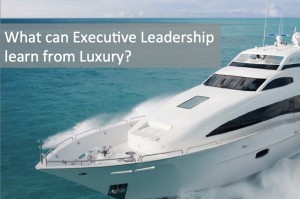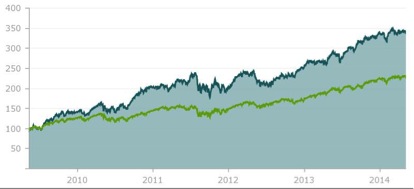What makes for good leadership?
There are as many books as there are opinions on this topic. One way to look at this question is to look at industries and areas that are doing something right. So why look at Luxury as a proxy? Firstly, let’s establish that luxury as whole is an industry that is doing tremendously well in a still flaky economic environment. A favorite chart of mine is the S&P Global Luxury (blue line) Index compared to S&P 500: Five years of growth and ‘outperformance’ …
… and if you were to look a few years further back in time you would find another astonishing fact: yes Luxury took a dip too after the fall of Lehman Bros and the tail spin the world economy went into. But it got hit a lot less hard. And more importantly: it recovered much faster and stronger than any other sector.
There reasons for this phenomenon? Economics of course (think the accelerated growth of wealth in Asia; with China leading the pack) and the continued globalization and the increased ability of firms to take advantage of this (think scale, luxury conglomerates). However, there is one more: the deeper meaning inherent in the intangibles that come with buying into luxury.
It’s a long list of what makes a brand luxury and not everything in this sector can be looked at as a positive proxy when it comes to leadership. For example, luxury is exclusive, often elitist and that does not bode well in a world where leadership is also an art of taking people with you. However, there are a few very good ‘ingredients’ that make for a good start when exploring what we can learn from Luxury and its potential implications for leadership. Let’s focus on three critical ones:
Heritage, Anchorage and Purpose
Luxury brands are steeped in history. They tend to find their beginnings decades or even centuries ago. They are generally characterized by humble beginnings: family businesses going back over generations. It provides them with anchorage, a clear sense of why they exist, what they are good at and whom they serve.
A Culture of Excellence
 Luxury products are made by (or delivered by: think service) real people. Craftsmen, their skills honed over decades and generations in some instances, are at the core of what the luxury story encapsulates: something special made for someone very special. Luxury companies live a culture of excellence in which good is not good enough. Employees are genuinely passionate about what they do. They identify with the brand and product to a degree where they are willing to put their name on it. Think of Aston Martin for example, where every engine block will carry the name of the engineer taking the car through its final inspection.
Luxury products are made by (or delivered by: think service) real people. Craftsmen, their skills honed over decades and generations in some instances, are at the core of what the luxury story encapsulates: something special made for someone very special. Luxury companies live a culture of excellence in which good is not good enough. Employees are genuinely passionate about what they do. They identify with the brand and product to a degree where they are willing to put their name on it. Think of Aston Martin for example, where every engine block will carry the name of the engineer taking the car through its final inspection.
Integrity, Humanity and Trust
By knowing exactly who they are, where they come from and what they do well, luxury companies are not short of clarity. The promises they make are lived by, the extent to which they go to source materials and produce products and services are exceptional. The materials they use are honest, real. In turn, this builds trust with customers over time. Integrity is not in materials only, but in the behavior when things go wrong. And because luxury products are almost by definition hand-made, things can go wrong. In real luxury, this is understood by the consumer, based on a reciprocal relationship between the craftsmen and the end customer, the common denominator often being that passion that goes both into making and owning a luxury product.
If executive leadership would root more strongly in heritage, real purpose with a view to the future beyond the next quarter, if leadership is there to celebrate a culture of excellence based on integrity, humanity and trust, would we not be better off?
Markus Kramer is the previous Global marketing director for Aston Martin and brand building expert at Zurich-based Brand Affairs, a high-powered team focusing on supporting brands and businesses in the areas of strategic growth, brand management, all aspects of communication and retail development. Markus is a TomorrowToday associate, and available to speak at conferences on workshops. Contact us for more information.



Trackbacks/Pingbacks